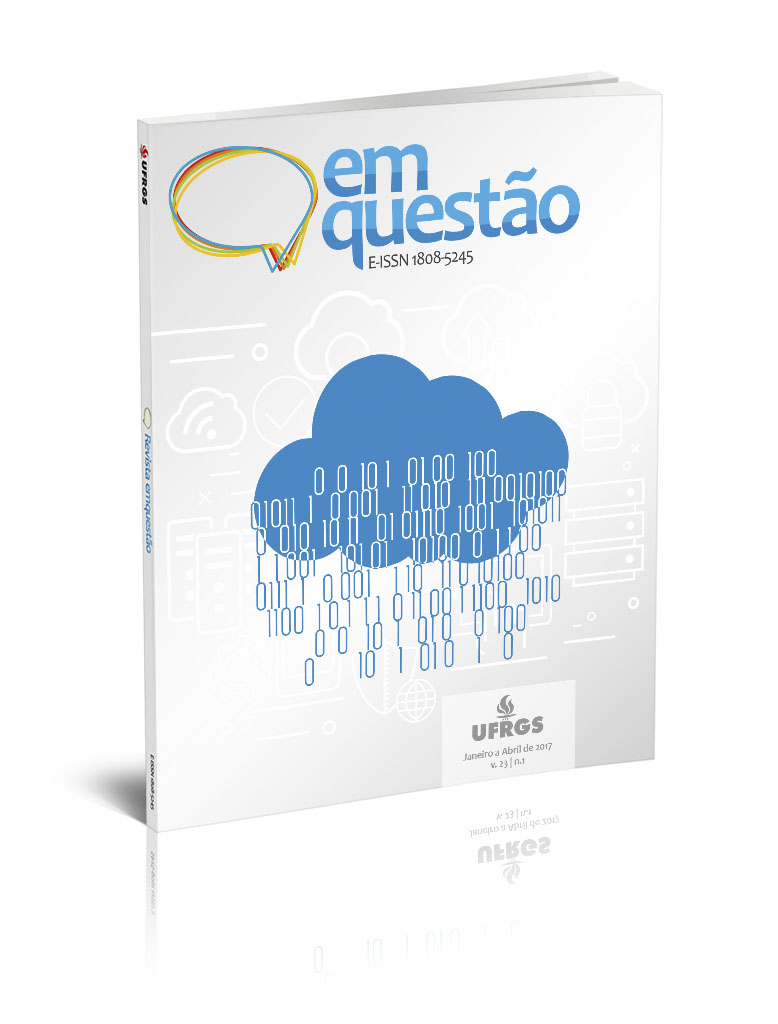Semantic-discursive representation of cibercordeis
DOI:
https://doi.org/10.19132/1808-5245231.129-153Keywords:
Representation of Information. Cibercordel. Semantic-discursive.Abstract
This investigation aimed to analyze the representation of the information of cibercordeis through semantic procedures of theming and figurativization, central elements of the indexing process. The corpus for this article were the cibercordéis, that enable the appropriate environment to be treated from the perspective of informational representation, for presenting textual elements such as themes, pictures, inspirations, aspirations, mottos, that is, specificities constructed through popular poetry which, in this case, appropriates of the web to be perpetuated within the cyberspace. From the research, it was found that the representation of information through discursive semantics shows itself as another real way to index documents, especially for observing all its textual features, concrete and abstract aspects, focusing that indexing, through discursive semantic as a methodological conception, significantly reduces the inherent subjectivity of the professional information, plus approach substantially to the documentary language, for producing a constant interdisciplinary exchange, relating figures to natural language and themes to artificial language. For this reason, the documents understood as cibercordéis are liable for informational representation, allowing thus enhance a recovery of organized information in a fast and systematic way.Downloads
References
ALBUQUERQUE, M. E. B. C. de. Literatura popular de cordel: dos ciclos temáticos à classificação bibliográfica. 2011. 314 f. Tese (Doutorado em Letras) – Programa de Pós-Graduação em Letras, Universidade Federal da Paraíba, João Pessoa, 2011. Disponível em: <http://tede.biblioteca.ufpb.br/handle/tede/6183>. Acesso em: 01 fev. 2016.
ANTONIO, D. M. O percurso gerativo de sentido aplicado à análise documental de textos narrativos de ficção: perspectivas de utilização em bibliotecas universitárias. 2008. 138 f. Dissertação (Mestrado em Ciência da Informação) – Faculdade de Filosofia e Ciências, Universidade Estadual Paulista, Marília, 2008.
BARROS, D. L. P. de. Teoria semiótica do texto. 4. ed. São Paulo: Ática, 2005. (Série Fundamentos, 72).
CAMPOS, M. L. A. Perspectivas para o estudo da área de representação da informação. Ciência da Informação, Brasília, v. 25, n. 2, 1995. Disponível em: <http://revista.ibict.br/ciinf/article/view/661/665>. Acesso em: 01 fev. 2016.
CAPURRO, R. Epistemologia e ciência da informação. In: ENCONTRO NACIONAL DE PESQUISA EM CIÊNCIA DA INFORMAÇÃO, 5., 2003, Belo Horizonte. Anais... Belo Horizonte: ENANCIB, 2003. Disponível em: <http://www.capurro.de/enancib_p.htm>. Acesso em: 01 mar. 2016.
FARIAS, J. G. de. Semiótica discursiva, a semiótica de Greimas. São Paulo: Universidade Anhembi Morumbi, [2000?]. Slides.
FIORIN, J. L. Elementos de análise do discurso. 14. ed. São Paulo: Contexto, 2008.
FONSECA, M. G. C.; ALVES, M. H. N. P.; CAVALCANTE, A. P. P. Audio/voz: uma ferramenta online como recurso para a oralidade do cibercordel. In: CONGRESSO DE CIÊNCIAS DA COMUNICAÇÃO NA REGIÃO NORDESTE, 12., 2010, Campina Grande, PB. Anais… Campina Grande: Intercom, 2010.
GAUDÊNCIO, S. M. Representação da informação de cibercordéis em blogs: uma análise sob a luz da semântica discursiva. 2014. 232 f. Dissertação (Mestrado em Ciência da Informação) – Programa de Pós-Graduação em Ciência da Informação,Universidade Federal da Paraíba, João Pessoa, 2014. Disponível em: <http://tede.biblioteca.ufpb.br/handle/tede/3953>. Acesso em: 20 jul. 2016.
GUEDES, E. G. F.; MORAES, J. B. E. de. Análise documentária e semântica discursiva: proposta de definição de temas para a Literatura de Cordel. In: SIMPÓSIO INTERNACIONAL DE INICIAÇÃO CIENTÍFICA, 14., 2006, São Paulo. Anais... São Paulo: UNESP; USP, 2006.
GREIMAS, A. J.; COURTÉS, J. Dicionário de semiótica. São Paulo: Contexto, 2008.
MIRANDA, M. L. C. Organización y representación del conocimiento: fundamentos teóriocs y metodológicos para la recuperación de la información en entornos virtuales. CONGRESSO ISKO-ESPAÑA, 7., 2007, León. Anais... León: Universidad de León, 2007.
NASCIMENTO, B. do. Literatura de cordel: dupla dimensão semântica. In: BATISTA, M. de F. B. M. et al. (Orgs.). Estudos em literatura popular II. João Pessoa: UFPB, 2011. p. 221-240.
NEVES, D. A. de B. Representação temática da informação e mapas cognitivos: interações possíveis. Informação & Sociedade, João Pessoa, v. 22, n. especial, p. 39-47, 2012. Disponível em: <http://www.ies.ufpb.br/ojs/index.php/ies/article/view/13300/8208>. Acesso em: 01 mar. 2016.
O CORDEL anima discussão no Itaú cultural. Estadão, São Paulo, 28 nov. 2003. Caderno 2. Variedades.
PRESSER, N. H.; SILVEIRA, M. A. A. da; BRAZ, M. I. Organização e representação das informações acadêmicas: um recurso de gestão. Revista Digital de Biblioteconomia e Ciência da Informação, Campinas, v. 10, n. 1, p. 16-30, jul./dez. 2012. Disponível em: <http://periodicos.sbu.unicamp.br/ojs/index.php/rdbci/article/view/1894>. Acesso em: 07 nov. 2016.
REDIGOLO, F. M.; ALMEIDA, C. C. de. Algumas contribuições da perspectiva filosófico-semiótica de Peirce para a análise de assunto. DataGramaZero, Rio de Janeiro, v. 13, n. 3, jun. 2012.
SOBRAL, A. Considerações epistemológicas sobre a semiótica Greimasiana. Estudos Semiótico, São Paulo, v. 5, n. 1, 2009. Disponível em: <http://www.revistas.usp.br/esse/article/view/49234>. Acesso em: 04 fev. 2016.
SOUSA, D. L. B. de. Ciber-Cordel: uma expressão contemporânea da dinâmica da Literatura Popular em verso. In: COLÓQUIO INTERNACIONAL DE COMUNICAÇÃO PARA O DESENVOLVIMENTO REGIONAL, 12., 2007, Fortaleza. Anais... Fortaleza: [s.n.], 2007. Disponível em: <http://encipecom.metodista.br/mediawiki/index.php/Ciber-cordel:_uma_express%C3%A3o_contempor%C3%A2nea_da_din%C3%A2mica_da_literatura_popular_em_verso>. Acesso em: 1 mar. 2016.
Downloads
Published
How to Cite
Issue
Section
License
Copyright (c) 2016 Em Questão

This work is licensed under a Creative Commons Attribution 4.0 International License.
Authors who publish with this journal agree to the following terms:
Authors will keep their copyright and grant the journal with the right of first publication, the work licensed under License Creative Commons Attribution (CC BY 4.0), which allows for the sharing of work and the recognition of authorship.
Authors can take on additional contracts separately for non-exclusive distribution of the version of the work published in this journal, such as publishing in an institutional repository, acknowledging its initial publication in this journal.
The articles are open access and free. In accordance with the license, you must give appropriate credit, provide a link to the license, and indicate if changes were made. You may not apply legal terms or technological measures that legally restrict others from doing anything the license permits.













